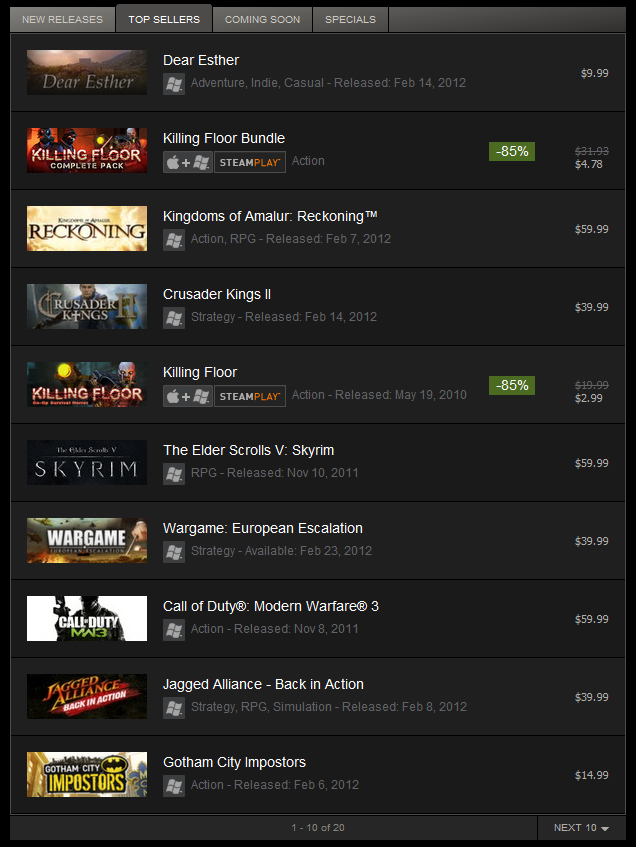Dear Esther has reached profitability. It took 5 hours, 30 minutes.
Dear Esther was released on Steam yesterday, February 14th. In under 24 hours, the game has sold over 16,000 copies, and Indie Fund's investment was recouped after just 5.5 hours. Those are great first-day sales for any game, independent or otherwise. Because the Indie Fund loan is already covered, Dear Esther is now profitable.
To be honest, we are a little surprised by how many people bought Dear Esther so quickly. We were expecting the game to have a niche appeal. In fact the situation is quite different; all day it was the top-selling game on Steam:

So, released among games about killing, reckoning, crusading, killing and really old scrolls (containing really old magic... for killing), the meditative beauty of Dear Esther has been recognized. Congratulations to the team behind the game, and thank you to everyone out there who bought the game or told a friend about it.
Indie Fund has a commitment to openness with financials, so here are the relevant details.
We have been in contact with Dan Pinchbeck of thechineseroom since March 2010. The original Dear Esther had already been produced, back in 2008, in the form of an inconvenient-to-install Steam mod that could be downloaded for free. The mod got many peoples' attention at the time. Dan's first proposal to us was to fund an ambitous game that would be a spiritual sequel to Dear Esther. At about the same time, he told us about Robert Briscoe's popup: true side-project to rebuild the Dear Esther mod with higher-end graphics.
We talked with Dan on and off about the potential new game for about a year. Due to various interactions with the bureaucracies surrounding universities and government funding sources, it had been uncertain how we could fund the new game. Meanwhile, though, Rob's rebuild of Dear Esther had become a full project of its own. In April 2011, Dan switched gears and came to us to fund the completion of the Dear Esther rebuild, asking for £30K. We deliberated; even though the original Dear Esther was highly regarded among the art game community, we weren't sure if people would buy it. Here's an excerpt from an email we sent Dan in May 2011:
One thing we are thinking as we play the demo is that the Steam audience may not be the right one for the game. We don't think it's a bad idea to release on Steam, but we don't know how well the game will do there (our thoughts so far are, "maybe the game will break even, maybe it won't, but it won't make a decent margin of money".) Us as the fund are not really concerned about making much money, but what we hope is that the developers get a big audience and make enough that they are set for a while. So our hope would be that you make enough that you can self-fund [the bigger game] (or else get less outside funding for it than you would otherwise, or else at least have Esther sales that serve as a demonstration that this format can work well, so that people can invest in the next game with confidence). What we are thinking is that PSN may actually be the best audience for the game, since PSN has a tradition of doing arty stuff, and so it might be good to launch on both PSN and PC simultaneously.
We appear to have been very wrong about all this. We are happy to have been wrong. One month after Dan's proposal, we voted to fund Dear Esther. Since the budget was relatively small and the team needed a large chunk of the money right away, we sent them the entire investment, $55k (USD), in one lump sum. As discussed in the Q.U.B.E. write-up, we liked the way this eliminates most of the hassle that comes with monthly-milestone kinds of situations. Dan and associates had a very solid track record, so we did not worry about the game getting finished. From the point we funded it, the Dear Esther remake was on autopilot as far as Indie Fund was concerned. We'd ask Dan for one-paragraph status updates every couple of months, offer a small suggestion here and there, and let them continue with their work. Finally, the game was finished, on budget. The result is in your hands today! Congratulations once again to Dan, Rob, Jessica, and everyone else who contributed to the game. It's great to see a game like to see Dear Esther doing well and we hope this means the next game will be much easier to make!
Dear Esther
Developer
The Chinese Room